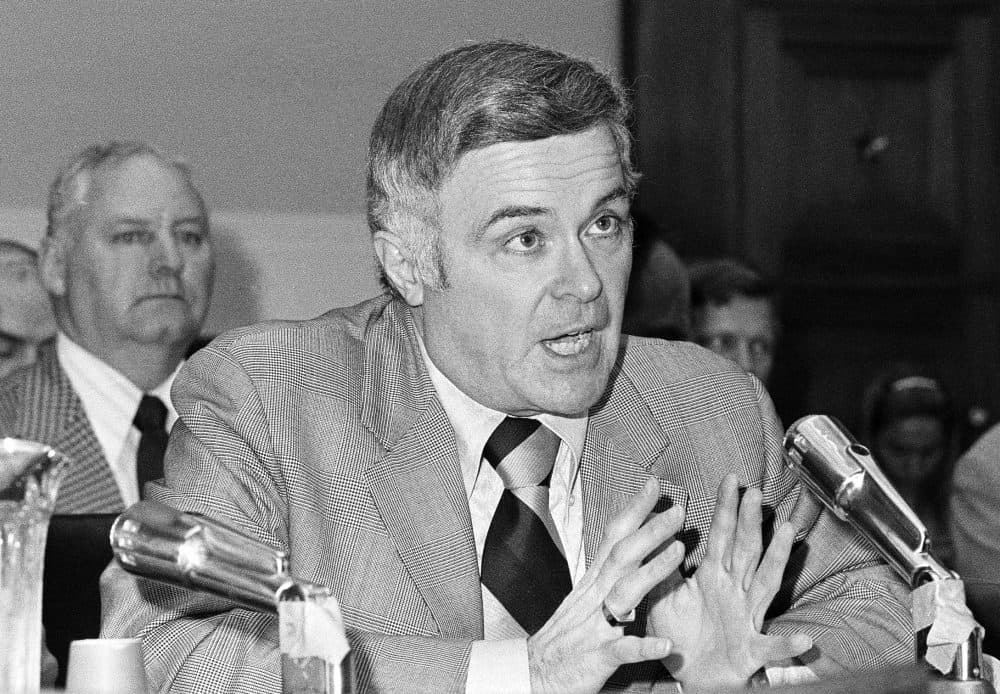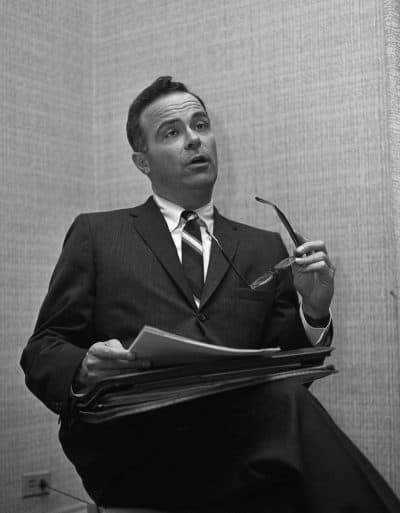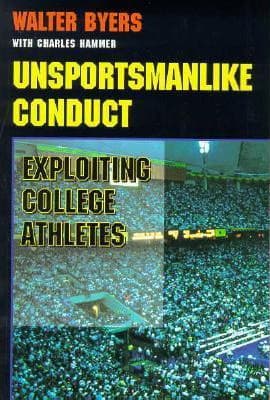Advertisement
NCAA Show
Walter Byers: The Man Who Built The NCAA, Then Tried To Tear It Down
Resume
This story is part of Only A Game's special episode about the past, present and future of the NCAA. Find the full episode here.
In September of 1955, Ray Dennison, an Army vet and father of three, took the field for the Fort Lewis A&M Aggies. On the opening kickoff return, Dennison's helmet collided with the ball carrier’s knee. The base of Dennison's skull was shattered. He died 30 hours later.
His widow, Billie, sued Fort Lewis A&M for workers' comp benefits on behalf of her husband, who'd been a scholarship athlete.
Feeling like the entire amateur system would crumble if schools were forced to pay workers' comp claims for athletes, NCAA executive director Walter Byers met with his legal team and came up with a strategy to make sure no one would mistake a college athlete for an employee entitled to benefits.
Schools were told to refer to players as "student-athletes." They were to speak of "college teams," not "clubs," which was a term used by the pros. They included an amateurism pledge with every scholarship offer.
It worked. Dennison's widow lost her suit, and the term stuck.
The First Executive Director
Walter Byers became the NCAA's first full-time employee in 1951, when he was just 29 years old. And pretty quickly, he established a reputation.
"A workaholic type of guy," says former Sports Illustrated senior writer Jack McCallum. "He was very strict. He had these rules about how you dressed when you went to the NCAA office."

For the next four decades, Byers served as the NCAA's first executive director. He took the organization from being nothing more than a "debating society for amateurism," established during Teddy Roosevelt’s day, to the moneymaking operation it is today.
Byers established the NCAA's enforcement division and, in the name of amateurism, went after schools and coaches caught breaking the rules.
At the same time, he grew the business of the NCAA. And at that, he was spectacularly successful. He negotiated a long string of increasingly lucrative TV deals, and turned March Madness into an economic and social sensation.
But, he didn’t enjoy the spotlight.
"He didn't even go to the NCAA Basketball Tournament," McCallum says. "I gotta tell you how extraordinary that is. That's like Roger Goodell not showing up at the Super Bowl."
'He Was Suggesting That The NCAA Should Try Another Way'
But in 1984, schools sued the NCAA for the right to control their own TV deals. The case went all the way to the Supreme Court. The NCAA lost.
This is what would lead to the explosion in television money. It’s what made schools and conferences rich. But at the time, it was seen as a real setback for the NCAA.
So Jack McCallum requested an interview with Walter Byers.
Byers said yes.
"I had prepared for this interview like I had done with no other," McCallum says, "because talking to Byers was sort of like you were going in to talk to the leader of a foreign nation who had never been seen. But five minutes into the interview, he suddenly says, 'You know, I've reached the point where I've started thinking about an open division, to make it more, for want of a better word, professional.'"
Walter Byers had been an unrelenting defender of amateurism for more than 30 years. And now, with no warning, he was suggesting that the NCAA should try another way.
"'Holy hell, what's he saying?'" McCallum remembers thinking. "'This does not sound like it's coming from the mind of Walter Byers.'"
"I had prepared for this interview like I had done with no other, because talking to Byers was sort of like you were going in to talk to the leader of a foreign nation who had never been seen."
Jack McCallum
Byers was called in front of the NCAA council to defend himself. The council wasn't entirely pleased that the guy in charge had just undermined their entire business model.
Remembering 'A Forgotten Man'
In 1988, Byers retired to his cattle ranch outside of Kansas City. And the NCAA doubled down on amateurism.

In 1995, he published his memoir. He called it "Unsportsmanlike Conduct," and it’s basically a takedown of all he had built, and an apology for how little he had been able to do, in the end, to fix it.
But the book didn’t make much of a splash.
"By the time he wrote the book, I think he was a little bit of a forgotten man," McCallum says.
Byers didn’t go on a book tour. He didn’t make the morning talk show rounds. Congress didn’t ask him to testify.
Byers almost never spoke in public. But a year before his book came out, he made an exception. He was 73 years old.
"Let me first say, this means a great deal to me," Byers started in the speech. "Every year you go past 70, you get a greater appreciation for being remembered."
It was the Kansas City Sports Commission’s annual gala dinner. The group was presenting Byers with an award for his "exceptional contribution to amateur sports."
And Byers used his time at the podium to attack amateurism:
"Each generation of young persons come along and all they ask is, 'Coach, give me a chance, I can do it.' And it's a disservice to these young people that the management of intercollegiate athletics stays in place committed to an outmoded code of amateurism.
"And I attribute that to, quite frankly, to the neo-plantation mentality that exists on the campuses of our country and in the conference offices and in the NCAA. The coach owns the athlete's feet, the college owns the athlete's body and the athlete's mind is supposed to comprehend a rulebook that I challenge Dave Berst, who's sitting down in this audience, to explain in rational terms to you inside of eight hours."
Byers paused. A few people in the audience applauded, but most did not.
Check out more from Only A Game's episode on the NCAA here.
This segment aired on October 14, 2017.
